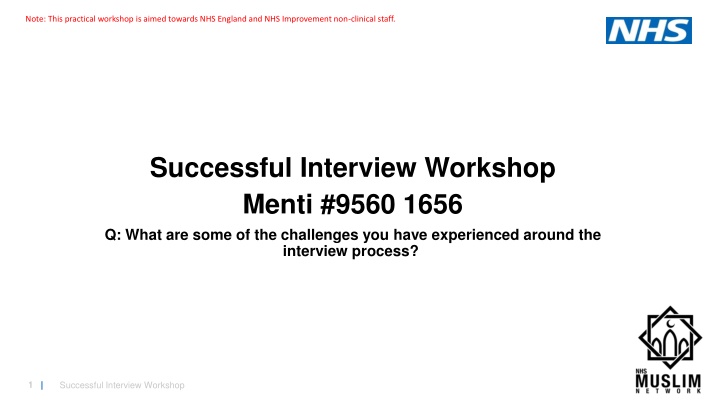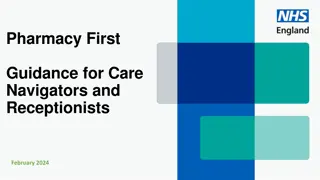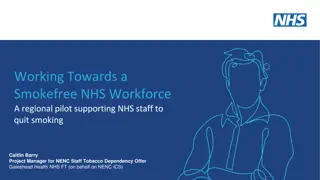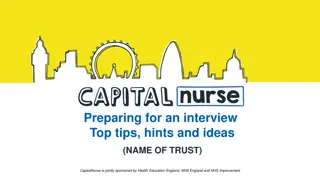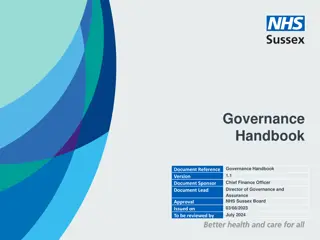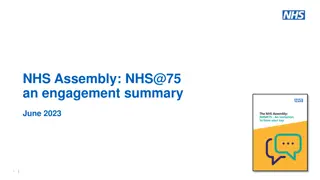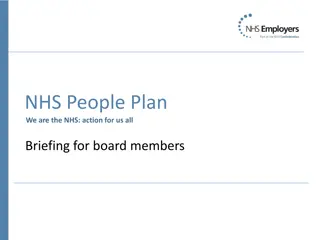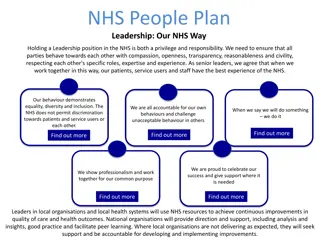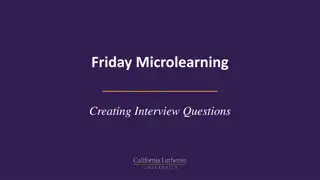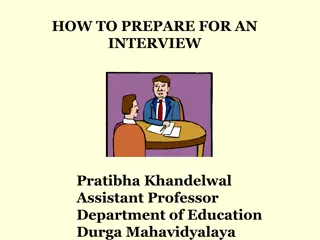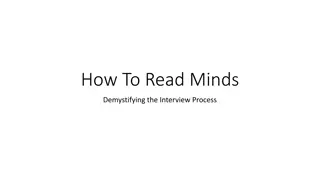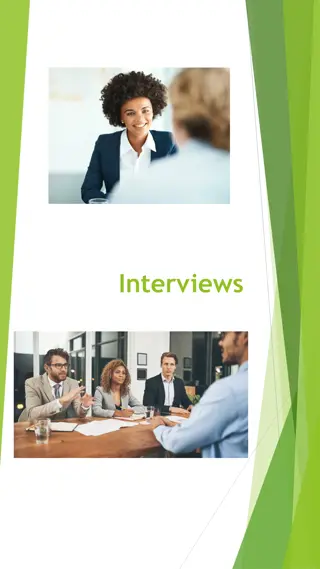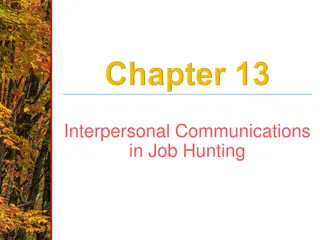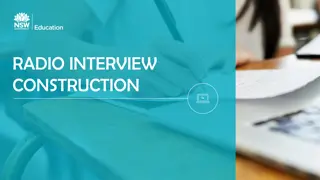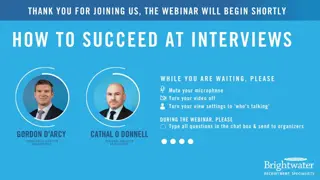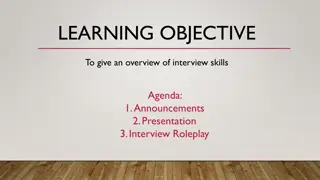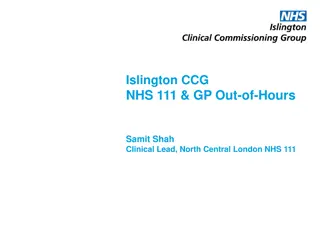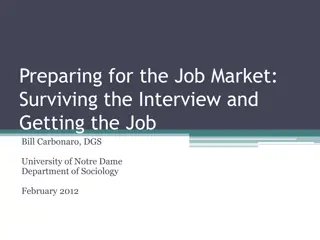Challenges in NHS Interview Process
Practical workshop aimed at NHS non-clinical staff focusing on challenges in the interview process. Topics include issues faced, Muslim network representation, deadline for applications, housekeeping rules, and WRES report findings.
Download Presentation

Please find below an Image/Link to download the presentation.
The content on the website is provided AS IS for your information and personal use only. It may not be sold, licensed, or shared on other websites without obtaining consent from the author.If you encounter any issues during the download, it is possible that the publisher has removed the file from their server.
You are allowed to download the files provided on this website for personal or commercial use, subject to the condition that they are used lawfully. All files are the property of their respective owners.
The content on the website is provided AS IS for your information and personal use only. It may not be sold, licensed, or shared on other websites without obtaining consent from the author.
E N D
Presentation Transcript
Note: This practical workshop is aimed towards NHS England and NHS Improvement non-clinical staff. Successful Interview Workshop Menti #9560 1656 Q: What are some of the challenges you have experienced around the interview process? 1 | 1 | Successful Interview Workshop
NHS Muslim Network Aims Representation to represent Muslim staff in the NHS and provide a collective voice for Muslim colleagues, including raising awareness of the Islamic faith and raising issues with senior management, in order to allow Muslim staff in the NHS to work in an inclusive environment where they can bring their whole selves to work. Networking and progression to provide a forum for Muslim professionals in the NHS to network and build contacts and local communities, as well as providing opportunities for development to support career progression and an increase in Muslim staff in senior positions. Inequalities to support the NHS and other key stakeholders in tackling health inequalities in the Muslim community, through health promotion activities with key stakeholders and co-developing health programmes and policy in support of the wider Government health objectives, in order to address the wide health inequalities and ensure equity and equality in health outcomes and programmes. To find out more, please visit our website https://nhsmuslimnetwork.co.uk/ or contact us at England.muslim1@nhs.net 2 | 2 | Successful Interview Workshop
Deadline for applications is COP 7th March 2022 To find out more, please visit our website https://nhsmuslimnetwork.co.uk/important-recruiting-new-co-chairs-for-the- nhs-muslim-network or contact us at England.muslim1@nhs.net 3 | 3 | Successful Interview Workshop
Housekeeping rules Use the MS Teams raise hand function if you would like to speak Attendees to be on mute during presentations Put questions and thoughts in MS Teams chat 4 | 4 | Successful Interview Workshop
Menti results - Q: What are some of the challenges you have experienced around the interview process? 5 | 5 | Successful Interview Workshop
Workforce data Findings A deep-dive into ESR data for NHSE&I staff have shown that: A large proportion of Muslim staff are in low band positions (Band 7 and below) There is little evidence of career progression Glass ceiling at Band 8a WRES report has shown that: For NHS trusts white staff are 1.61 times more likely to be appointed over BME staff. (WRES March 2021) BAME staff are successful at securing interviews but fall out on securing the role. 6 | 6 | Successful Interview Workshop
Pre-application Decision to apply You ve seen a job ad that looks interesting, now what? How do you consider whether you apply? Best friend POV practice Feedback folder Signalling Preparing to apply Competency examples have the drafts ready and prepared a few months in advance ~ 80% ready Writing good competency examples takes a lot longer than you think a lot of iterative editing Record good examples short after they happened so as not to work from memory much later Mentor 7 | 7 | Successful Interview Workshop
What are competency-based questions? Competency-based questions are interview questions that require candidates to provide real-life examples as the basis of their answers. Candidates should explain why they made certain decisions, how they implemented these decisions and why certain outcomes took place. These examples should demonstrate the skills, knowledge and behaviours of the competency. If no real-life examples, give a first principles answer. Common competency areas: Collaborating and partnering Leadership Making effective decisions Communication Delivering at pace Building capability for all EDI 8 | 8 | Successful Interview Workshop
Research Job description and job advert Read the job description (JD) What Knowledge, Skills and Behaviours (competencies) are required for the role? Look-up the work/business of the team Is there any recent news or publications from the team? Who is the recruiting manager? Have they provided contact details? Have you got some questions to ask them? Poll: have you ever contacted a recruitment manager? 9 | 9 | Successful Interview Workshop
Preparing your response (Band 7) Potential JD (example) Types of questions you may be asked based on the JD 10 | 10 | Successful Interview Workshop
Preparing your response 11 | 11 | Successful Interview Workshop
Preparing your response what competencies does the role require? Time = Working to deadlines Working under pressure Team work/Working with Others Building and maintain relationships Working as part of a team Communication = Communicating with spectrum of audiences 12 | 12 | Successful Interview Workshop
Preparing your response (Band 8a) As Policy and Project Manager, the post holder will support the Medicines Policy Lead(s), Assistant and Deputy Directors in identifying and progressing current and new areas of medicines policy work, with a specific focus on medicines supply. This will include ensuring that workstreams are planned and managed effectively and delivered successfully. The ideal candidate will have a good understanding of the health and care landscape (or a demonstrated ability to learn) and the key organisations working within it. They will understand the role and remit of NHSEI, and its vision for the NHS. In addition, they will have an excellent understanding of current affairs and have an interest in the work of Parliament and the local, regional and national political landscape. This role best suits an individual who is comfortable working independently as well as part of a project team and is able to rapidly build effective working relationships with a range of stakeholders. Key Job specifics and responsibilities Delivering High Standards To develop policies and associated materials that are well written, well researched and tested with others as required To respond to relevant correspondence and queries in relation to specific medicines policy areas in a timely and accurate manner To support the delivery of NHS Mandate, business plan and other strategic priorities related to the Unit s work. To provide the secretariat and coordination of appropriate Programme Boards and project working groups To actively identify and manage risks, issues and interdependencies associated with specified projects Promoting equality and reducing inequalities To uphold organisational policies and principles on the promotion of equality To create an inclusive working environment where diversity is valued, everyone can contribute, and everyday action ensure we meet our duty to uphold and promote equality Working with others To work in partnership with others and as part of cross directorate teams to deliver successful outcomes To manage and actively promote relationships with internal stakeholders and coordinate liaison with external stakeholders for whom there is project dependence (NICE, HEE, PHE, MHRA etc.) To represent the NHSEI Medicines Policy Unit or the organisation more widely in key conversations, meetings or other forums as appropriate 13 | 13 | Successful Interview Workshop
Preparing your response (Band 8a) As Policy and Project Manager, the post holder will support the Medicines Policy Lead(s), Assistant and Deputy Directors in identifying and progressing current and new areas of medicines policy work, with a specific focus on medicines supply. This will include ensuring that workstreams are planned and managed effectively and delivered successfully. The ideal candidate will have a good understanding of the health and care landscape (or a demonstrated ability to learn) and the key organisations working within it. They will understand the role and remit of NHSEI, and its vision for the NHS. In addition, they will have an excellent understanding of current affairs and have an interest in the work of Parliament and the local, regional and national political landscape. Work Standards This role best suits an individual who is comfortable working independently as well as part of a project team and is able to rapidly build effective working relationships with a range of stakeholders. Key Job specifics and responsibilities Delivering High Standards To develop policies and associated materials that are well written, well researched and tested with others as required To respond to relevant correspondence and queries in relation to specific medicines policy areas in a timely and accurate manner To support the delivery of NHS Mandate, business plan and other strategic priorities related to the Unit s work. To provide the secretariat and coordination of appropriate Programme Boards and project working groups To actively identify and manage risks, issues and interdependencies associated with specified projects Equality, Diversity and Inclusion (EDI) Promoting equality and reducing inequalities To uphold organisational policies and principles on the promotion of equality To create an inclusive working environment where diversity is valued, everyone can contribute, and everyday action ensure we meet our duty to uphold and promote equality Teamwork Working with others To work in partnership with others and as part of cross directorate teams to deliver successful outcomes To manage and actively promote relationships with internal stakeholders and coordinate liaison with external stakeholders for whom there is project dependence (NICE, HEE, PHE, MHRA etc.) To represent the NHSEI Medicines Policy Unit or the organisation more widely in key conversations, meetings or other forums as appropriate Developing an excellent organisation To support the organisation s ways of working, model its values and champion the NHS Constitution 14 | 14 | Successful Interview Workshop
Where can I find out about NHS competencies? Specialist areas in the NHS will have their own competency frameworks, but there is overlap in 7 core competencies in non-clinical areas: Demonstrating Personal Qualities Working with Others Managing Services Improving Services Setting Direction Creating the Vision Delivering the Strategy Leadership Academy (useful even in non-leadership roles): https://www.leadershipacademy.nhs.uk/wp-content/uploads/2012/11/NHSLeadership-Leadership- Framework-Clinical-Leadership-Competency-Framework-CLCF.pdf National Job Profiles Administrative services updates - updated February 2021 Public relations Patient services Legal services Information services Information management and technology Human resources Finance Business administration projects - updated February 2021 15 | 15 | Successful Interview Workshop
Youve been offered an interview, now what? How to structure your responses STAR technique Practicing your responses Advice and tips 16 | 16 | Successful Interview Workshop
What is wrong with this answer? Question: can you tell us about a time when you had to make a difficult decision, and how you went about making the decision? I have been in many situations where I have had to make a difficult decision. I am a decisive person and I think I do this well. I like to take time to think through options and make a decision based on the available evidence. Too general question is asking to describe a specific time No reference to the impact of the decision made Referring to many situations, question has asked you to pick one 17 | 17 | Successful Interview Workshop
What is wrong with this answer? Question: can you tell us about a time when you had to make a difficult decision, and how you went about making the decision? My team and I recently had to decide if we were going to end a project early, we had a group discussion where we reviewed the timelines and we chose to continue the project but with fewer deliverables rather than ending it. Referring to we rather than I what was your personal role in all of this. Referring to a specific time but no context given, why did you need to make this decision? No reference to the impact/result of this decision. 18 | 18 | Successful Interview Workshop
STAR technique The STAR technique is a method of answering questions that consists of four steps: Situation: Describe the situation and when it took place. Try and make it a big picture statement. Wow factor Task: Explain your task and what was the goal Action: Provide details about the action you took to attain this Result: Conclude with the result/impact/achievement of your actions STAR is ideal for competency/strength based interviews which will typically ask you to describe a time when.... It allows you to structure your answers, bring out your contributions and focus on how you achieved an outcome. The four STAR steps are not equal and you should spend most of the answer time on Action If you have 5 minutes to answer a question: Situation and Task 30 seconds to 1 minute max Action 4 to 4.5 minutes Result one sentence at the end about the impact/achievement 19 | 19 | Successful Interview Workshop
What is wrong with this answer? Question: can you tell us about a time when you had to make a difficult decision, and how you went about making the decision? There was a time when I was working on a very critical project for the top of the office team. They were very concerned with a particular situation in a number of trusts and because of all the media attention I had to provide a very time critical answer. The question was very difficult to research, the data was poor, there was a lot of pressure and I had to work extra long hours. In the end we managed to put together the report. Too much time on situation and background there is no time to talk about your actions that s the part that is getting scored Not talking about the impact 20 | 20 | Successful Interview Workshop
STAR framework SITUATION Describe the situation and when it took place. Try and make it a big picture statement. Wow factor TASK Explain your task and what was the goal ACTION Provide details about the action you took to attain this, draw out any additional complications as this will give you higher scores RESULT Conclude with the result/impact/ achievement of your actions Question Cancer is one of the key priorities in the NHS LTP, research about cancer waiting times has an impact on patient outcomes. I was leading the team of x people doing the research on cancer waiting times to a tight deadline. I had to prioritise research areas to meet the deadline. I drew up a list of key stakeholders with the help of the senior leaders in my team and consulted them on the most topical areas. I talked to the subject matter experts to understand what data were available and what research was feasible to do within the timelines. I and the team completed the research on time, the research played an important part in setting standards for cancer waiting times for patients. Can you tell us about a time when you had to make a difficult decision, and how you went about making the decision? I made a decision based on.../ I consulted with my team to make a joint decision on ... what was both feasible and highly demanded to research. Throughout this, I kept in touch with my customers, making a suggestion about the proposed course of action and they agreed. 1 minute 4 minutes 30 seconds 21 | 21 | Successful Interview Workshop
Advice and tips on STAR Some questions will overlap in terms of the competency that they are assessing: 1. Please tell us about a time where you had to juggle conflicting tasks and work pressures, and how you did this? 2. Can you give us an example where you had to work to meet conflicting deadlines? What was the result of this? Both questions are assessing your time management skills and ability to work under pressure. This means you could prepare one example that talks about juggling different commitments/deadlines and shape this to suit the question s exact wording. Do not learn off an answer that is tailored to one specific question because if you give this response to a slightly different question, it will show. You need to have a flexible example that can be adapted on the spot to address the same competency if the question is framed differently. 22 | 22 | Successful Interview Workshop
Practice and feedback Mentor Poll: Do you have a mentor? Line manager support (if possible) Always set up a mock interview Practice Recording Mirror etc. With a person e.g. family member/friends, colleague 23 | 23 | Successful Interview Workshop
Advice and tips Interview Technique Choosing Examples Common Mistakes: read off screens; not taking time to think before answering; thinking the interviewers are there to trip you up Advice ask to repeat the question from the panel or repeat the question back to the panel to make sure you have it right, write down key points of a competency being asked, pause to think before answering, succinct answers are good, look at the panel for clues, virtual interviews, always state the obvious, avoid technical jargon, make sure to not run out of time Highlighting your achievements some may feel uncomfortable, see it as showing off etc. Always think about maximising your scores: do not neglect mandatory questions (e.g. EDI); enable cross-scoring of your competencies; check your answers to see if you have as much scoreable content as possible After the interview Before the interview Make a note of the questions you were asked and keep these in a question bank The Best Friend Imagine you are feeding back to a third person this will make you more objective and increase confidence Always ask for feedback (even if you get the job!) Rehearse record yourself (either voice notes or video) Hold a mock interview with your manager or mentor 24 | 24 | Successful Interview Workshop
Session 2 For session 2, please prepare a STAR answer for one of the following questions: 1. Give an example of when something didn t go your way. What did you do and how did you overcome it? What did you learn from the situation? 2. Give an example of when you needed to deliver a piece of work under tight timelines? What steps did you take to ensure quality was not compromised? 3. Give an example of when you have introduced a change to make an improvement? 4. Give an example of a time when you worked with teams internal and/or external to the organisation to deliver on a programme of work? 5. What have you done to improve equality and diversity in the workplace? A STAR template will be shared with you to help shape your answer. The template can be found on our website https://nhsmuslimnetwork.co.uk/member- development Date: Monday 21st March 2:30-3:30pm or Thursday 24th 11:30am-12:30pm Registration form: https://forms.office.com/r/Zh5BJth7Pr 25 | 25 | Successful Interview Workshop
Q&A 26 | 26 | Successful Interview Workshop
